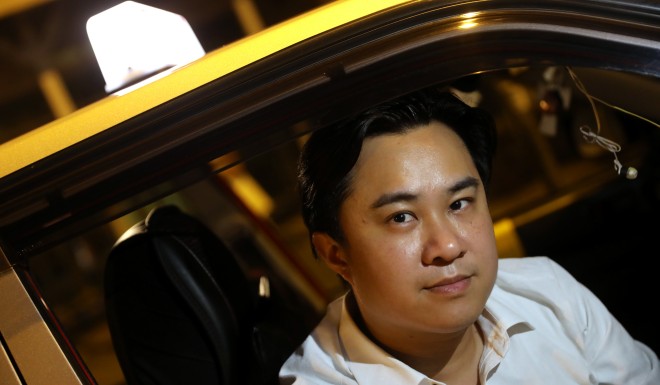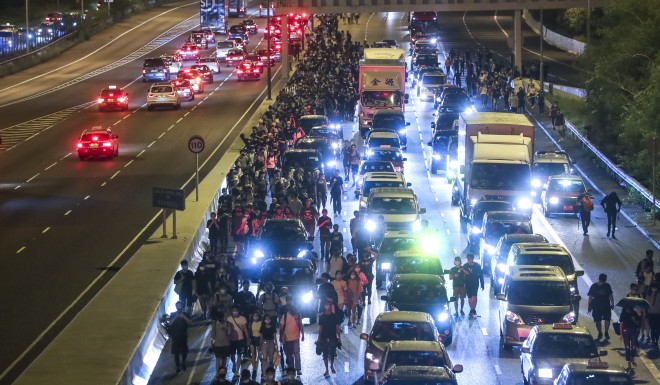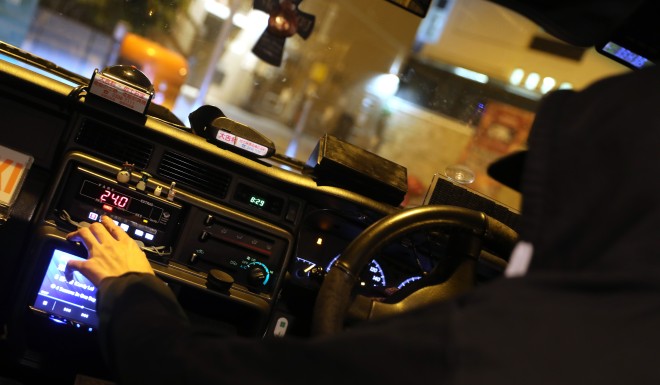By Cannix Yau
They are the invisible Hong Kong taxi drivers who have carried anti-government protesters away from police in the midst of countless confrontations over the past three months of political turmoil.
These “protest drivers” said they started to help the protest movement because they could not be at the front lines themselves.
Others said they felt sympathy with the protesters after watching too much violence on the nightly news.
Others still said they put themselves in danger to be like the Korean taxi driver Kim Sa-bok, now lauded as a hero for his actions during the democratization of South Korea in the 1980s.
Kim risked his life to drive a German journalist around a city in the southwest of South Korea in 1980 and helped expose a bloody crackdown on pro-democracy activists.
Others still said they put themselves in danger to be like the Korean taxi driver Kim Sa-bok, now lauded as a hero for his actions during the democratization of South Korea in the 1980s.
Kim risked his life to drive a German journalist around a city in the southwest of South Korea in 1980 and helped expose a bloody crackdown on pro-democracy activists.
His story was portrayed in the award-winning Korean film A Taxi Driver.
Franco Cheung Ching-ho, 32, said he knew he had to help as soon as Hong Kong’s protests erupted in June over a now-withdrawn extradition bill.
Franco Cheung Ching-ho, 32, said he knew he had to help as soon as Hong Kong’s protests erupted in June over a now-withdrawn extradition bill.
He decided to join the protest movement as a taxi driver behind the scenes.
“I couldn’t go to the front line to join the protests because I couldn’t stand the tear gas from the police,” Cheung said.
“I couldn’t go to the front line to join the protests because I couldn’t stand the tear gas from the police,” Cheung said.
“So I decided to use other means to help the movement.”

Taxi driver Franco Cheung has given free rides to protesters.

Taxi driver Franco Cheung has given free rides to protesters.
Cheung has deliberately driven around the protest zones with his not-for-hire sign on, offering free rides to black-clad protesters on the streets looking for escape routes.
He would also buy supplies, such as bottled water, snacks and face masks, and drop the items at dispatch points for the protesters.
He said a conversation he had in July with four young protesters he drove from Causeway Bay to Kowloon Bay made him even more determined to help.
“One of them said he was prepared to face a riot charge if arrested by police. He mentioned it in a light and casual way: ‘If 10 years in jail is the worst that could happen to me, I can take it’,” Cheung said.
“I was stunned by their resolve. Those young protesters were all prepared to sacrifice the golden years of their lives for the movement. I swore to them I would do whatever it takes to fight for democracy with them.”
He said of all the free rides he had given protesters, the most dangerous was on September 1 when crowds of anti-government protesters besieged Hong Kong International Airport.
“At around 5pm, I heard that some protesters were trapped in Tung Chung who were trying to walk to the Lantau Link toll plaza to find their way out. I immediately drove to the plaza to pick up some protesters – though I felt very nervous for fear of being stopped by police,” he said.
When Cheung got to the plaza, he was struck by an unforgettable image – a long line of private cars moving slowly along the roads to take the protesters to the city.
“I was deeply moved by the scene – so many private car owners took a risk to rescue the protesters. It strengthened my conviction that I did the right thing,” he said.

Volunteer drivers wait to give protesters a free ride back to the city during an airport protest on September 1.
What pushed 35-year-old taxi driver Andrew Chan to help the protesters was watching them risk their lives to challenge the authorities and police to fight for their freedom and democratic rights.
Chan, a frontline protester of the 2014 Occupy movement, said he could not join the protests this time because of health problems so he decided to help under the cover of being a taxi driver.
Like Cheung, he drove around protest zones to offer free rides.
He said a conversation he had in July with four young protesters he drove from Causeway Bay to Kowloon Bay made him even more determined to help.
“One of them said he was prepared to face a riot charge if arrested by police. He mentioned it in a light and casual way: ‘If 10 years in jail is the worst that could happen to me, I can take it’,” Cheung said.
“I was stunned by their resolve. Those young protesters were all prepared to sacrifice the golden years of their lives for the movement. I swore to them I would do whatever it takes to fight for democracy with them.”
He said of all the free rides he had given protesters, the most dangerous was on September 1 when crowds of anti-government protesters besieged Hong Kong International Airport.
“At around 5pm, I heard that some protesters were trapped in Tung Chung who were trying to walk to the Lantau Link toll plaza to find their way out. I immediately drove to the plaza to pick up some protesters – though I felt very nervous for fear of being stopped by police,” he said.
When Cheung got to the plaza, he was struck by an unforgettable image – a long line of private cars moving slowly along the roads to take the protesters to the city.
“I was deeply moved by the scene – so many private car owners took a risk to rescue the protesters. It strengthened my conviction that I did the right thing,” he said.

Volunteer drivers wait to give protesters a free ride back to the city during an airport protest on September 1.
What pushed 35-year-old taxi driver Andrew Chan to help the protesters was watching them risk their lives to challenge the authorities and police to fight for their freedom and democratic rights.
Chan, a frontline protester of the 2014 Occupy movement, said he could not join the protests this time because of health problems so he decided to help under the cover of being a taxi driver.
Like Cheung, he drove around protest zones to offer free rides.
For a night of free rides, he said he lost about HK$1,000 ($127), which after a few nights cost him about 20% of his monthly income.
“In the past, I cared about making money. But for them, I don’t mind earning less. I hope to contribute more because I can’t be on the front line,” he said.
Chan said he felt increasingly nervous about helping the protesters because the police crackdown was getting more intense and aggressive.
“In the past, I cared about making money. But for them, I don’t mind earning less. I hope to contribute more because I can’t be on the front line,” he said.
Chan said he felt increasingly nervous about helping the protesters because the police crackdown was getting more intense and aggressive.
But one encounter with a young girl had given him courage to keep defying the danger.
“She was about 16 or 17 without gear. I picked her up in Sheung Wan and she was very nervous. Once she got in my taxi, she immediately broke down in tears. I comforted her, but my heart sank heavily. What made a young girl like her so scared and sad? I knew then that I could not turn them away,” he said.

Taxi driver Andrew Chan was a frontline protester of the 2014 Occupy movement.
Jen Chan, 46, a taxi driver for seven years, said he would not deliberately look for protesters but would not hesitate to stop if he came across some of them in danger.
“She was about 16 or 17 without gear. I picked her up in Sheung Wan and she was very nervous. Once she got in my taxi, she immediately broke down in tears. I comforted her, but my heart sank heavily. What made a young girl like her so scared and sad? I knew then that I could not turn them away,” he said.

Taxi driver Andrew Chan was a frontline protester of the 2014 Occupy movement.
Jen Chan, 46, a taxi driver for seven years, said he would not deliberately look for protesters but would not hesitate to stop if he came across some of them in danger.
He said he had such an encounter earlier this month.
“It was a Friday night when I drove along Argyle Street near Kowloon City, I saw three black-clad teenagers running in fear. I wanted to help so I stopped, inviting them to get in my taxi,” he said.
“They were all gasping heavily and horror-stricken, unable to say anything. So I told them I was going to drop them off at a McDonald’s in San Po Kong. They left without saying anything,” he said.
“It was a Friday night when I drove along Argyle Street near Kowloon City, I saw three black-clad teenagers running in fear. I wanted to help so I stopped, inviting them to get in my taxi,” he said.
“They were all gasping heavily and horror-stricken, unable to say anything. So I told them I was going to drop them off at a McDonald’s in San Po Kong. They left without saying anything,” he said.

Aucun commentaire:
Enregistrer un commentaire